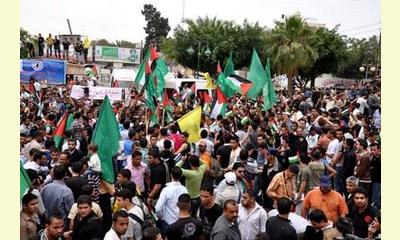|
|
Three challenges for the national unity government in Palestine
an article by Ziad Medoukh, professor at Al-Aqsa University, Gaza-Palestine
The reconciliation agreement between the various Palestinian movements was signed this week in Cairo, thanks to Egyptian mediation, but especially thanks to the popular demonstrations of the Palestinians who gathered in mass demonstrations to demand it. Other demonstrations of joy and support engaging the civil population of the Gaza Strip which suffered much from this division, followed this historical signature and since then, everyone impatiently aw its application in practice. 
Palestinians came out in the streets of Gaza to celebrate the signature of the reconciliation agreement between the various Palestinian movements
click on photo to enlarge
In this agreement, the first point relates to the formation of a government of national unity, a temporary government which would be composed of independent personalities, approved by Fatah and Hamas.
In the next two weeks, a new government thus will be born in the Palestinian territories, a government that will be charged to settle questions related to the division, and to unify the Palestinian institutions of Gaza, the West Bank and East Jerusalem, without forgetting the rebuilding of Gaza and btaining the end of the blockade that has lasted for more than 4 years.
No matter who are the members of this transition government, and no matter who is named its chief, I think that they will have to face three principal challenges: an interior challenge, an Israeli challenge and an international challenge.
The interior challenge: the inter-Palestinian situation is very complicated. We are faced with two different projects with different strategies. The first is a project of peace negotiation with the Israelis, a project involved within a peace process that has not led to concrete results, but which prefers popular and non-violent resistance against the occupation. The second is opposed to the first and prefers military resistance as a form of resistance to the occupation, even if this project does not have a national consensus and is often marked by a truce not posted with the Israelis. The new government will have to find a compromise.
Apart from this divergence, there is the question of security in the Palestinian territories: how to organize the work of its various services in the West Bank as in the Gaza Strip. There is also the problem of the weapons of the various factions. Also, one should not forget the rebuilding of Gaza, the end of the blockade, displacements between the Gaza Strip and the West Bank, geographical continuity between the two areas, and of course, how to erase the consequences of this division which lasted more than 4 years.
(This article is continued in the discussionboard - see righthand column of this page)
(For the original version of this article in French, click here.
|








|
DISCUSSION
There is no question yet associated with this article.
* * * * *
LATEST READER COMMENT:
(This article is continued from the article, Three challenges for the national unity government in Palestine )
The Israeli challenge: Israel is the main loser in this agreement. Any national unity between Palestinians requires it to face its responsibilities. It is for that the Israeli government will try by all the means to create problems for this new government. The threats have already started. The Israeli authorities will be able to close the passages which connect the Gaza Strip to the West Bank; they will be able to prohibit to Palestinian ministers to move between these two points, they will be able to also suspend the transfer of taxes to the Palestinian budget.
But the true danger will come especially from the provocations by Israel to certain Palestinian factions, in the form of attacks, of bombardments, and incursions, in particular in Gaza, in order to provoke their reaction by rocket fire, which would lead to a new escalation in the region. In this case, Israel would be the first beneficiary of this situation of war and instability under the pretext of defending its citizens and its safety.
And to finish, the international challenge: the official International community could, if it so decides, approve the Israeli position, cut the assistances granted to the Palestinian authority, and put pressure on this new Palestinian government to accept the conditions of the Middle East "Quartet", that is to say, the suspension of violence and the recognition of the agreements signed by Israel and the PLO. The official international community could take again its position of 2006 when itboycotted the government created after the elections of 2006 in the Palestinian territories.
Faced with these challenges, the new government will have to be firm, it will have to resist, continue to work, even under extremely difficult conditions and a particular context marked by threats and the lack of resources. . ...more.

|
|









